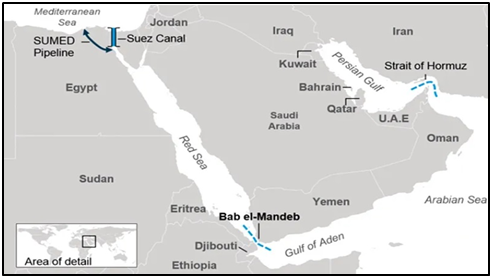Why in news?
- In a series of attacks on commercial vessels in the western Arabian Sea by the Houthi rebels, a Marshall Islands-flagged oil tanker Marlin Luanda came under a missile attack.
- The vessel had 22 Indian and one Bangladeshi crew members on board.
- While the ship was learnt to have caught fire and reported damage, no casualty or injury was reported at the time.
- It prompted a quick response from the Indian Navy’s guided missile destroyer INS Visakhapatnam, which was deployed in the Gulf of Aden.
What’s in today’s article?
- Red Sea
- Houthis
- Trouble in Red Sea and impact on India
Red Sea
- About

- Red Sea is narrow strip of water extending southeastward from Suez, Egypt, to the Bab el-Mandeb Strait.
- Basically, it is a narrow inland sea between the Arabian Peninsula and Africa.
- The Red Sea separates the coasts of Egypt, Sudan, and Eritrea from those of Saudi Arabia and Yemen.
- The Gulf of Aqaba, a northeastern extension of the sea, reaches southern Israel and southwestern Jordan.
- Significance
- The Red Sea contains some of the world’s hottest and saltiest seawater.
- It is one of the most heavily travelled waterways in the world, carrying maritime traffic between Europe and Asia.
- Significance for India
- Freight rates for Indian shipments headed to Europe and Africa could surge as much as 25-30 per cent if there is disruption along this route.
- For India, the Red Sea trade route is the shortest trade route for ships moving from Asia to Europe.
- India is heavily reliant on the Bab-el-Mandeb Strait for its crude oil, LNG imports and trade with parts of West Asia, Africa, and Europe.
- This route is vital for 30 per cent of global container traffic.
Houthis
- About
- The Houthis are a Shiite Muslim sect and political and military organization that emerged in Yemen (which is predominantly Sunni) in the 1990s.
- Named after the Houthi tribe, they are Zaydi Shias.
- Zayadism is a sub-sect of Shia Islam and it believes in following the lineage of the Prophet Muhammad’s family, as the political leader of the state.
- The Houthis are also known as Ansar Allah, which translates to "Supporters of God".
- Involvement in civil war of Yemen
- The Houthis are one side of the Yemeni civil war that has raged for nearly a decade.
- Yemen’s civil war began in 2014 when Houthi insurgents took control of Yemen’s capital and largest city, Sanaa.
- By early 2015, Saudi Arabia, along with other Gulf states and with U.S. support, was launching airstrikes against the Houthis, who are backed by Iran.
- A ceasefire was finally signed in 2022. It lapsed after six months but the warring parties haven’t returned to full-scale conflict.
- Houthis attacking Red Sea ships
- The Iran-backed Houthi rebels of Yemen have been attacking ships in the Red Sea in response to Israel's military campaign in Gaza.
- The Houthis support Hamas, and vowed to target vessels they believe are heading to and from Israel.
Trouble in Red Sea and Impact on India
- Trouble in Red Sea
- Attacks on cargo ships in the Red Sea since November 2023 by the Houthi militia of Yemen have increased.
- It has turned the quickest marine route linking Asia with Europe through the Suez Canal unsafe.
- It has forced freighters to take a longer transit around the Cape of Good Hope in Africa’s southern tip, making shipments both dearer and longer to deliver.
- Status
- Almost 90% of western hemisphere cargo, both inbound or shipped from India, that used to go through the Red Sea is now getting re-routed through the Cape of Good Hope.
- The remaining 10% of Indian import or export cargo is either not moving or using a transit facility.
- Container Corporation of India said that about 25% of its containers are being held back by Indian exporters as everybody is hoping the situation will normalise shortly.
- Impact on India
- These developments could make imports costlier and call for better inventory management.
- The Red Sea crisis could come in the way of any plans to reduce pump prices of petrol and diesel.
- Freight rates for impacted routes have increased.
- War risk premiums in the Red Sea have been partially contributing to the freight-rate increases for the relevant routes.
- Commodities are the worst affected whether it be chemicals, plastic, petrochemicals, because margins are not there to absorb the hike in freight.










